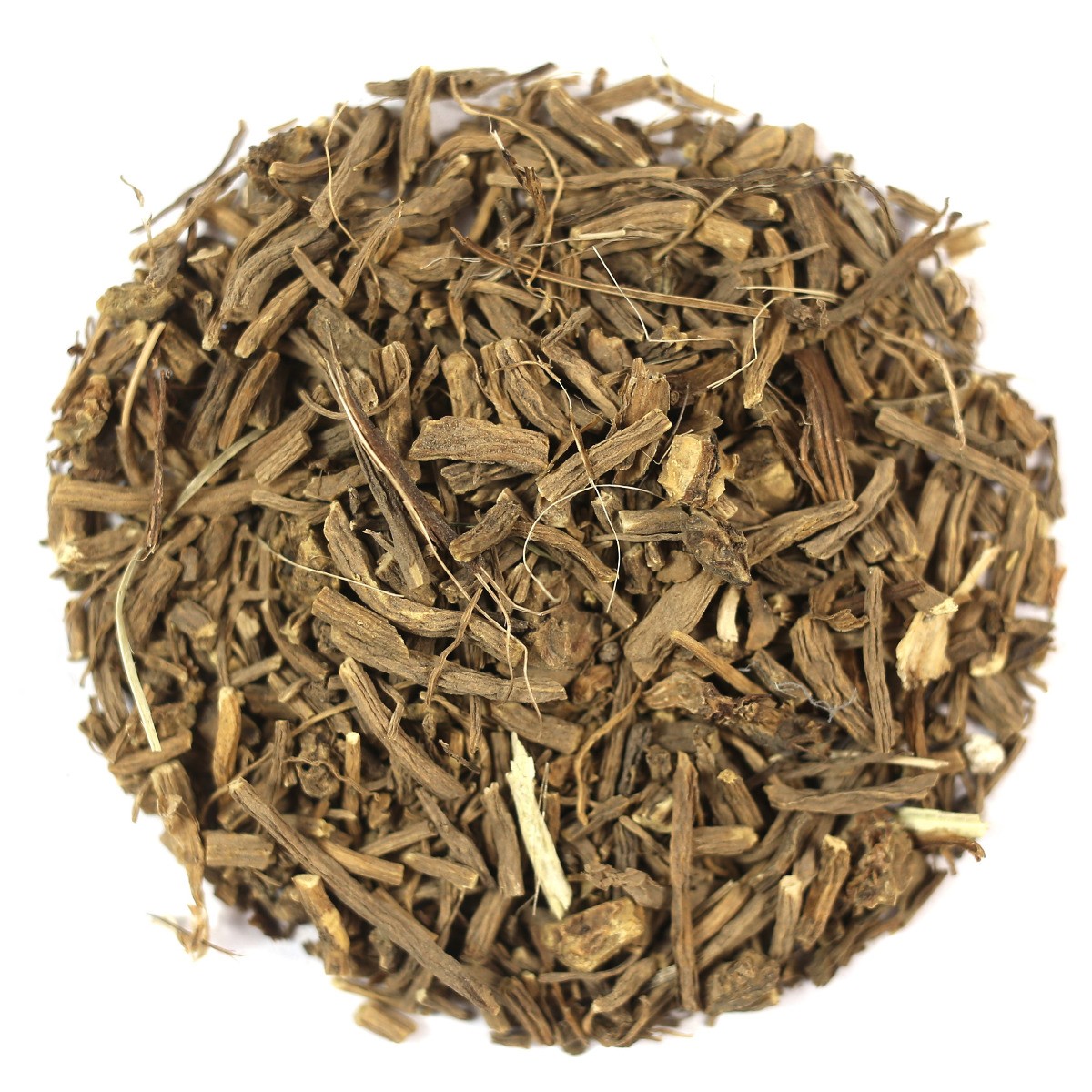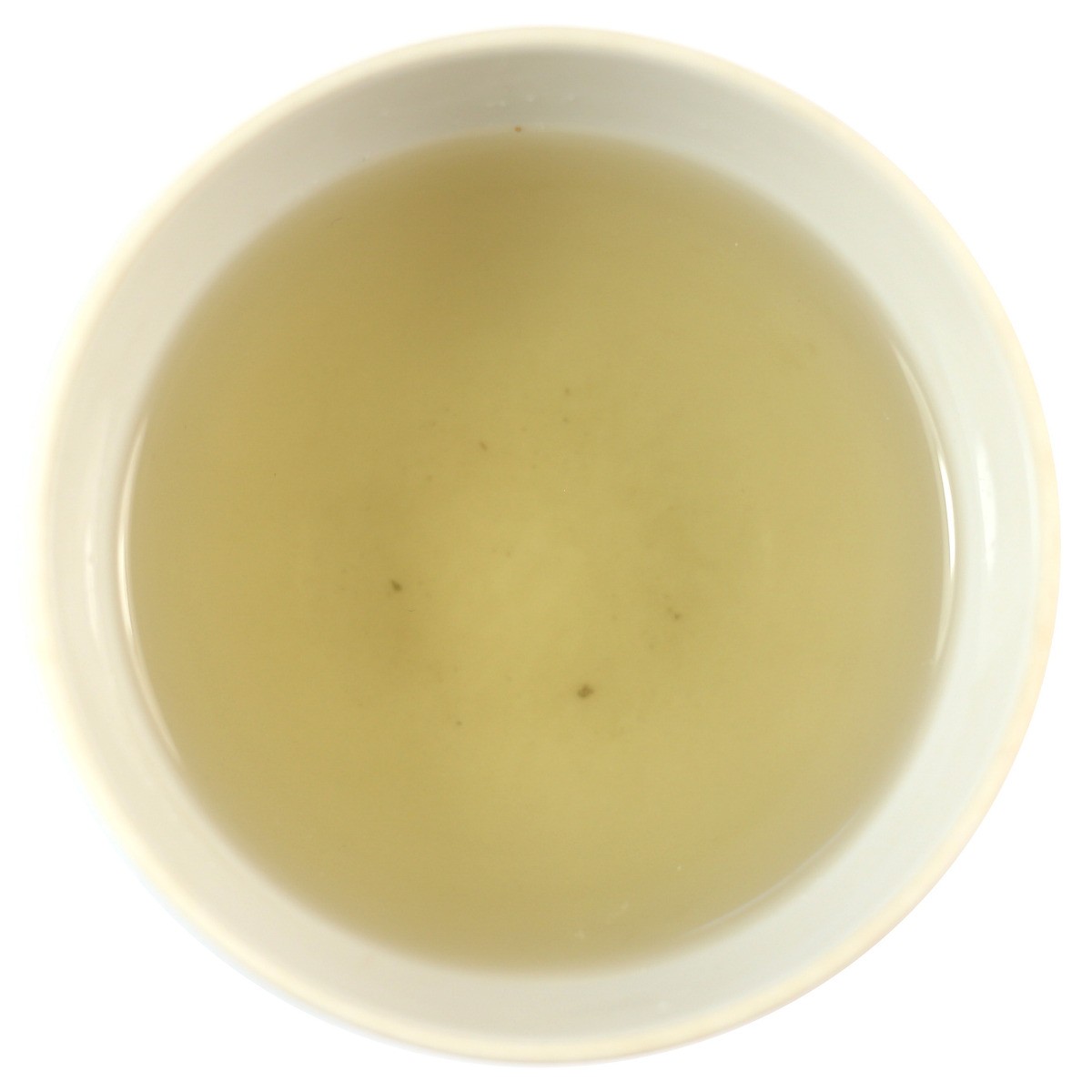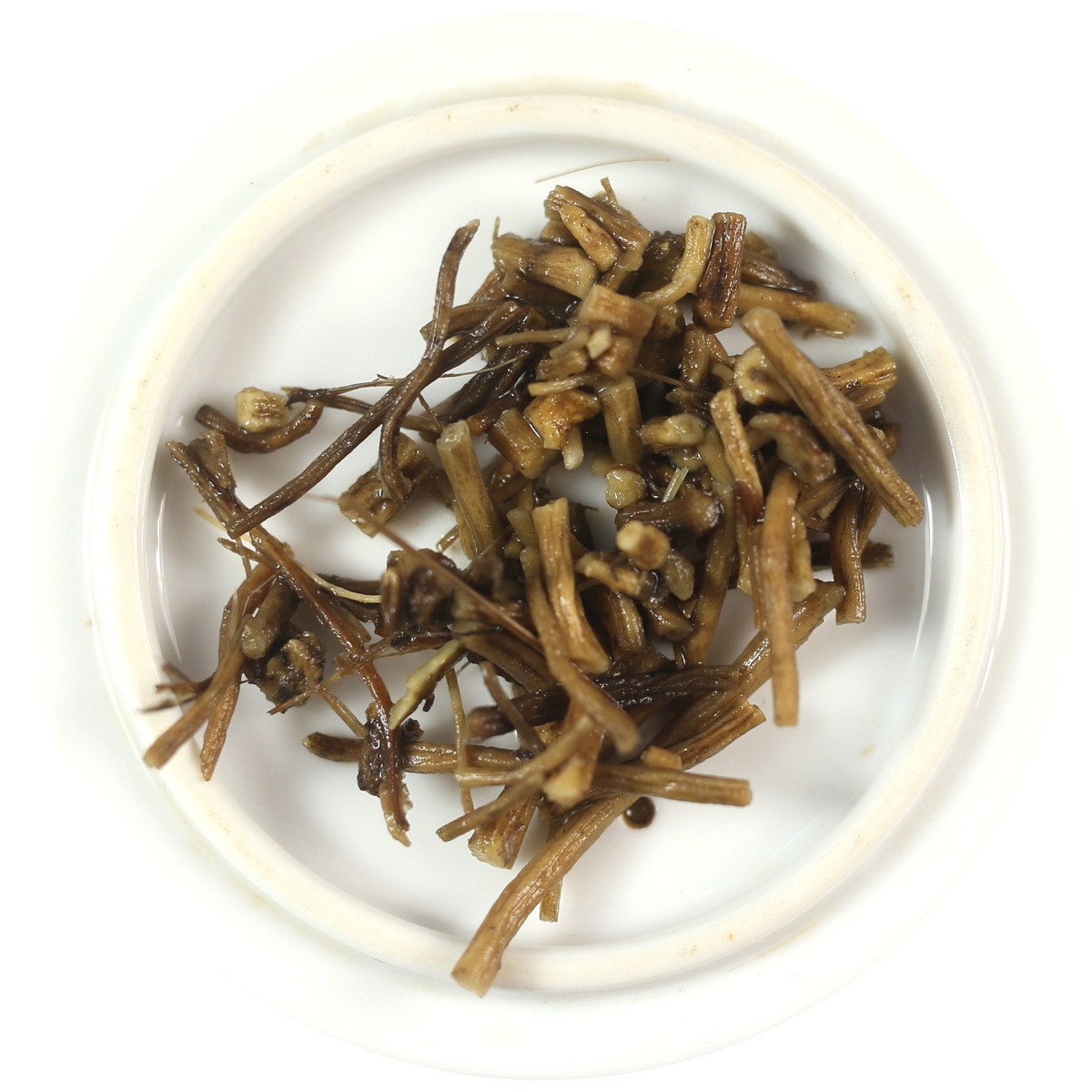Herbal Tea Brewing Guide

1 Teaspoon
Add 1 teaspoon per person and one for the pot.

95⁰c - 100⁰c
Boil using fresh water, at a temperature of 95⁰ - 100⁰c.

8 - 10 Mins
Steep for 8-10 minutes, depending on personal preference.
About Product
-
Product Description
Valerian Tea, a remarkable herbal infusion, is brewed from the desiccated root of the Valerian plant. This distinctive tea carries a potent aroma that some might find hard to accept initially. Despite this, its flavours – a delicate amalgamation of woody sweetness and rustic nuances – offer a calming experience, making it an ideal drink for any moment of the day.
Beyond its flavour, it brings a host of health benefits. Its medicinal properties are primarily attributed to valeric acid, an active ingredient acknowledged for inducing serenity and alleviating restiveness. Serving as a natural solution for insomnia and anxiety, and fostering a sense of calm, Valerian Root Tea is a worthy incorporation to your daily regimen.
So, whether you require a means to fight off stress, achieve undisturbed sleep or simply relax after a strenuous day, it is the perfect choice. Its rejuvenating properties make it an exceptional herbal tea that can elevate your overall well-being.
What is Valerian Tea
Made from the root of the Valerian plant (Valeriana officinalis). This plant is native to Europe and parts of Asia but is now also grown in North America due to its medicinal properties. The plant flourishes in grasslands and is easy to identify with its sweetly scented pink or white flowers.
The root, celebrated for its therapeutic qualities, is typically harvested in the autumn of the second year of the plant’s growth. The roots are then dried out and used to prepare Valerian Tea. The tea is characterised by its distinctive odour due to the presence of isovaleric acid and a variety of other volatile oils.
Though the aroma might seem uninviting at first, the tea’s woody sweetness and earthy undertones can be a soothing sensory experience, making the Valerian Herbal Tea a special brew indeed.
History of Valerian Tea
The history of Valerian Tea dates back to the times of Ancient Greece and Rome, when it was used as a medicinal herb by notable physicians such as Hippocrates and Galen. They prescribed it for a variety of ailments including insomnia, nervousness, and heart palpitations. Its Latin name, Valeriana, is derived from the verb ‘valere’, which means ‘to be strong’ or ‘to be healthy’. This signifies the potent healing properties associated with the herb in the ancient world.
During the medieval times in Europe, it was often referred to as ‘All Heal’. It continued to be a popular remedy for various health conditions, and its calming properties were greatly valued. The plant was also believed to have magical properties and was used in spells and charms to ward off evil and bring love.
In the 18th Century, it gained recognition in Sweden and was used extensively as a sedative and anti-anxiety remedy. Carl Linnaeus, the famous Swedish botanist, named it Valeriana officinalis.
In the 19th Century, Valerian Loose Leaf Tea became a common household remedy in the United States, highly regarded for its sedative effects and its ability to relieve nervous tension. It was officially listed in the U.S. Pharmacopoeia from 1820 to 1936.
Throughout the 20th Century, the popularity surged as people sought natural remedies for their health issues. Today, it continues to be a prominent feature in the world of herbal teas.
It serves as a testament to the wisdom of ancient cultures and their understanding of medicinal plants. Even in our modern world, where synthetic drugs are commonplace, this herbal infusion still holds a cherished place in many homes and health regimens around the globe.
How to Make Valerian Root Tea
Preparing Valerian Herb Tea is a relatively simple process that requires only a few ingredients and tools. Here’s a step-by-step guide to brewing your own calming cup of this herbal infusion:
Ingredients:
- 1 teaspoon of dried Valerian root
- 1 cup of boiling water
- Honey or sweetener of choice, to taste (optional)
Step 1: Begin by bringing the water to a boil in a kettle or a saucepan.
Step 2: Place the dried Valerian root in a tea infuser or a teapot. If you don’t have these, you can place the root directly in the cup.
Step 3: Pour the boiling water over the Loose Leaf Valerian Root Tea. If you’re using an infuser or a tea bag, ensure it is fully immersed in the water.
Step 4: Allow the tea to steep for about 5-10 minutes. The longer you leave it, the stronger the taste.
Step 5: Once the tea has steeped, remove tea infuser or strain the tea into a cup.
Step 6: Your Valerian Root Tea is now ready to be consumed. You can add honey or a sweetener of your own preference to mask the strong aroma and improve the taste.
Please note: It has a potent effect and it’s advised not to consume more than 2-3 cups a day. Always consult with a physician or a qualified herbalist before integrating it into your regular diet, especially if you are pregnant, nursing, or on medication.
Tasting Notes: With a unique earthy flavour with woody and sweet undertones. Its aroma is strong and distinct, but the taste is smooth and mild. With its calming effects, it can be enjoyed any time of the day or night.
Caffeine Content: Completely free of caffeine, making it an ideal choice for individuals seeking a caffeine-free herbal infusion. This lack of caffeine is one of the reasons it is often consumed as a bedtime beverage, as it won’t interfere with sleep cycles or cause the alertness associated with caffeinated drinks.
Storage Advice: Store the dried Valerian root in an airtight container in a cool, dry place away from direct sunlight.
What is Valerian Tea Good For
Valerian Tea, with its unique blend of woody sweetness and earthy undertone, offers a myriad of health benefits. It’s not just its calming properties that make it an appealing choice; there are numerous other reasons to include it in your daily regimen. Here are some of the beneficial outcomes associated with its regular consumption:
- Natural Sleep Aid: The active ingredient, valeric acid, found in this tea, is known to promote sleep and improve its quality. This makes it a popular natural remedy for insomnia.
- Anxiety and Stress Relief: Acclaimed for its soothing effect on the nervous system, helping to reduce anxiety, stress and nervousness.
- Promotes Heart Health: Regular consumption can aid heart health as it helps to lower blood pressure and reduce the risk of heart disease.
- Alleviates Menstrual Cramps: It is traditionally used to relieve the discomfort of menstrual cramps due to its antispasmodic properties.
- Digestive Aid: Its calming effect extends to the digestive system as well, helping to soothe digestive issues such as upset stomach, gas and bloating.
- Muscle Relaxation: Valerian root tea has been found to promote muscle relaxation, making it an ideal choice for those with muscle pain or tension.
A word of caution is advised for certain individuals considering the introduction of Valerian Tea into their daily routine. Particularly, expectant mothers or those on prescribed medication should consult with a healthcare professional to ensure the safe consumption of this herbal infusion. This is essential to prevent any potential adverse effects or interactions with medications.
In conclusion, Valerian Tea, with its rich history and health benefits, offers a natural and effective alternative to synthetic remedies for sleep disorders, anxiety, and many other health concerns. Its unique blend of earthy and woody sweetness makes it an inviting beverage at any time of the day.
Despite its strong aroma, Valerian Tea Benefits also have a calming attributes which more than compensate for its distinct scent. As with any herbal product, moderation is key, and it is always prudent to consult with a healthcare professional if you are pregnant, nursing, or on medication.
In the realm of herbal teas, Valerian Tea is a standout, a testament to the medicinal wisdom of ancient cultures that continues to hold true in our modern world.
-
Delivery Information
We offer reliable delivery services through Royal Mail to ensure that your orders reach you on time.
Here are the main points you should be aware of:
- Standard UK Delivery: £3.95 excluding delivery charge.
- Delivery Times: Orders are processed and dispatched within 2-5 working days but they may take longer during busy times. It is worth noting that all our orders are packed by hand in order to maintain the quality.
- Free Delivery: We are delighted to provide free shipping for UK orders over £35*. Moreover, customers from Europe can enjoy free shipping for any purchase above €75*. Furthermore, we offer free delivery in the USA for all purchases exceeding $125*. Please note terms and conditions may apply.
- Tracking: When your package is sent you will receive a tracking number via email so as to keep tabs of its progress.
International Shipping
We do ship worldwide meaning our products can be accessed by anyone around the world.
Here are some important details:
- Delivery Times: International deliveries vary based on destination, generally taking between 7-14 working days.
- Shipping Costs: International shipping costs are calculated at checkout based on your location and weight of your order. View full delivery charges for your location.
- Customs and Import Duties: Remember customs or import duties may exist depending on regulations in your country; these charges are borne by the customer.
Returns Policy
Your satisfaction is our top priority, however if for any reasons you’re not completely happy with your purchase, simply follow our returns procedure:
- Eligibility: Items returned within 30 days of receipt must remain unopened and in their original condition.
- Process: In order to return an item contact our customer service department using your unique order number after which detailed instructions will be given concerning returning them back to us securely.
- Refunds: Our aim is to refund you within 5-7 working days upon successful reception of returned goods. The refund amount will be credited to your original payment method.
For any other Enquiries or help please contact our Customer Support Team always at your service.
-
Product Reviews

 Loose Leaf Tea
Loose Leaf Tea Pyramids
Pyramids Tea Bags
Tea Bags Africa
Africa Assam
Assam Ceylon
Ceylon Chinese
Chinese Darjeeling
Darjeeling European
European Indian
Indian Japan
Japan Nepal
Nepal South East Asia
South East Asia Ayurveda Tea
Ayurveda Tea Black Tea
Black Tea Chai Tea
Chai Tea Flowering Tea
Flowering Tea Fruit Tisanes
Fruit Tisanes Green Tea
Green Tea Herbal Tea
Herbal Tea Matcha Tea
Matcha Tea Oolong Tea
Oolong Tea Organic Tea
Organic Tea Pu erh Tea
Pu erh Tea Rooibos Tea
Rooibos Tea White Tea
White Tea Asian Coffee
Asian Coffee Caribbean Coffee
Caribbean Coffee Central American Coffee
Central American Coffee South American Coffee
South American Coffee Coffee Blends
Coffee Blends Decaffeinated Coffee
Decaffeinated Coffee Espresso Coffee
Espresso Coffee Ethically Sourced Coffee
Ethically Sourced Coffee Flavoured Coffee
Flavoured Coffee Organic Coffee
Organic Coffee Single Origin Coffee
Single Origin Coffee Chocolate 1
Chocolate 1 Chocolate 2
Chocolate 2 Chocolate 3
Chocolate 3 Chocolate 4
Chocolate 4 Chocolate 5
Chocolate 5 Chocolate 6
Chocolate 6 Chocolate 7
Chocolate 7 Chocolate 8
Chocolate 8 Chocolate 9
Chocolate 9 Loose Tea Filters
Loose Tea Filters Tea Accessories
Tea Accessories Tea Bricks
Tea Bricks Tea Caddies
Tea Caddies Tea Caddy Spoons
Tea Caddy Spoons Tea Gift Ideas
Tea Gift Ideas Tea Infusers
Tea Infusers Tea Strainers
Tea Strainers




